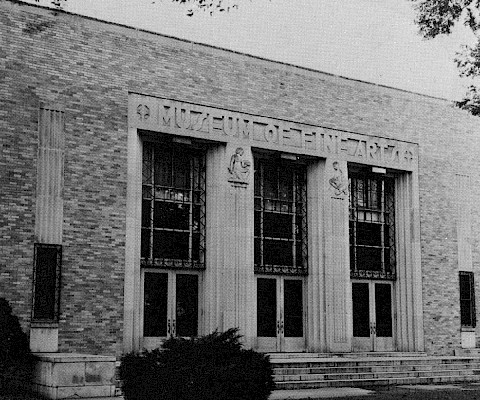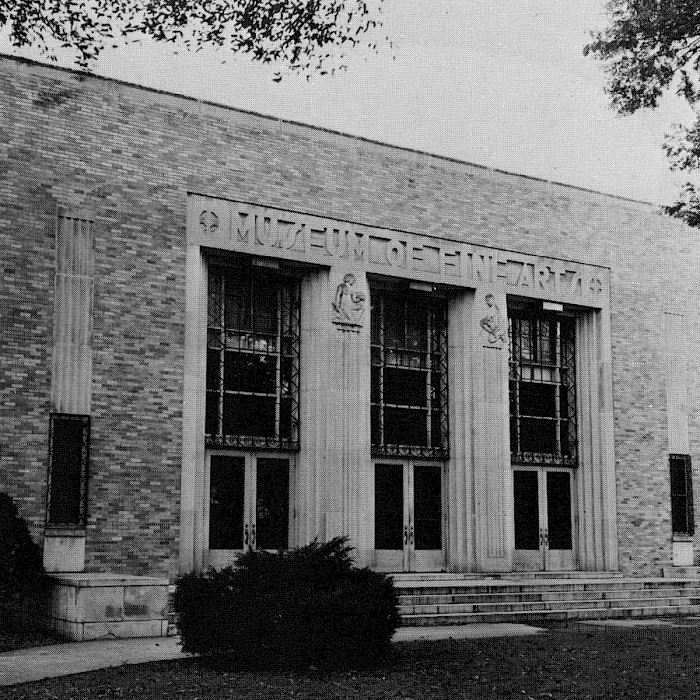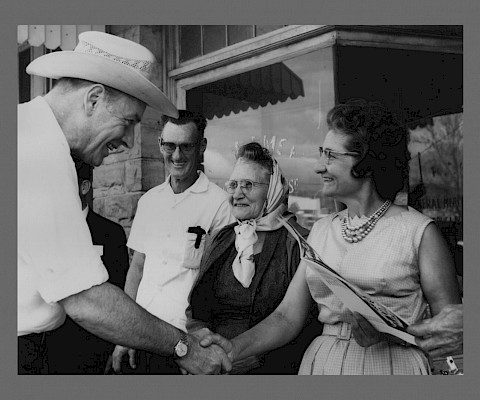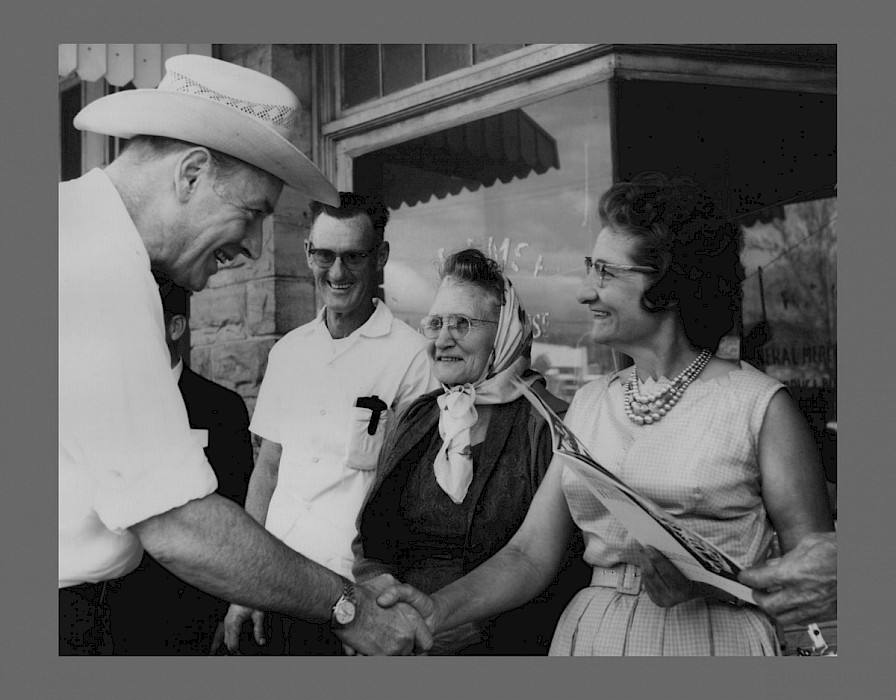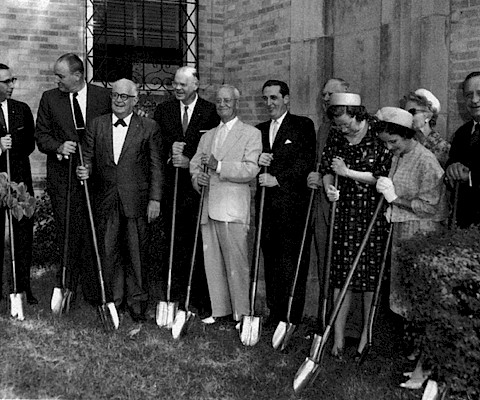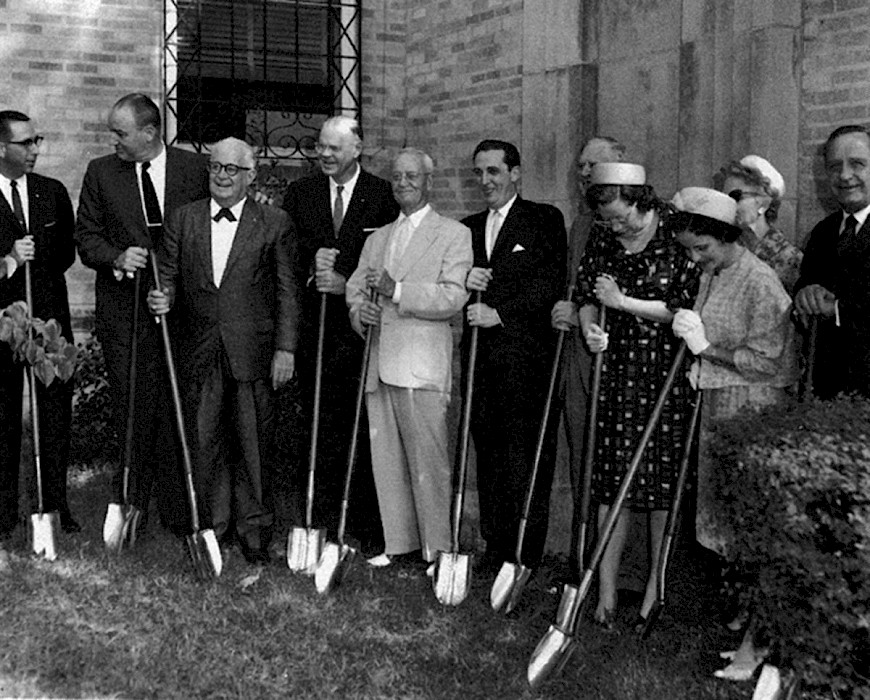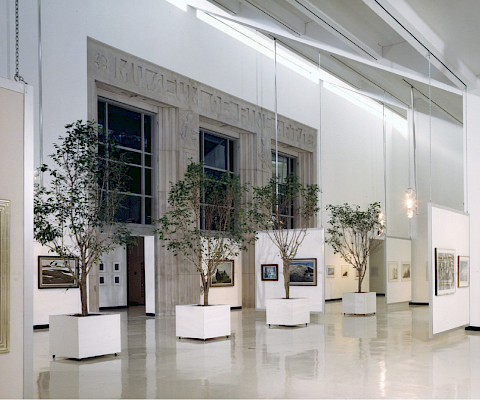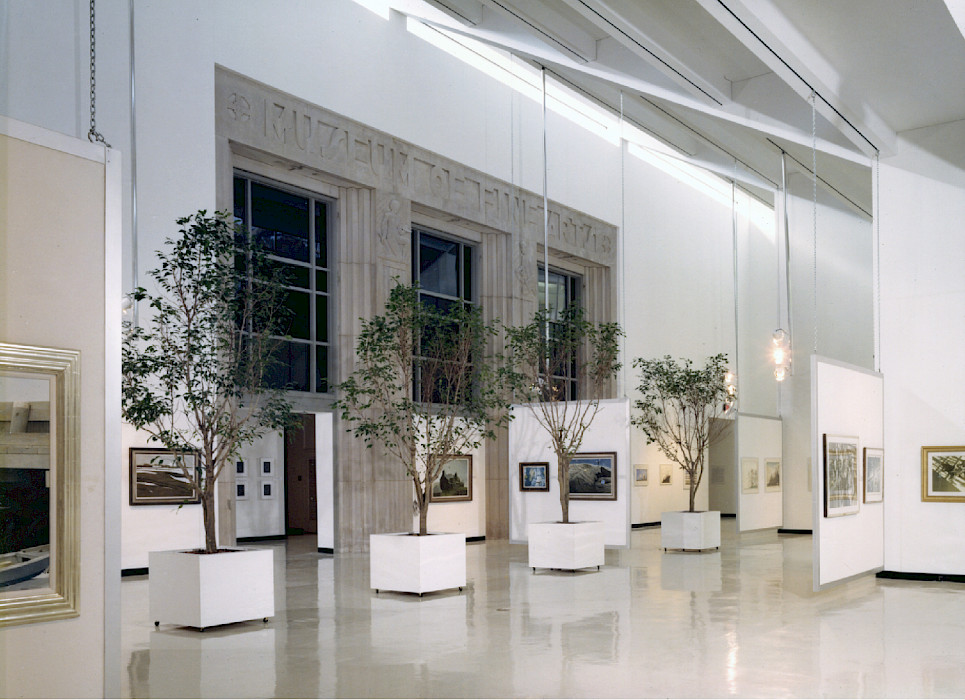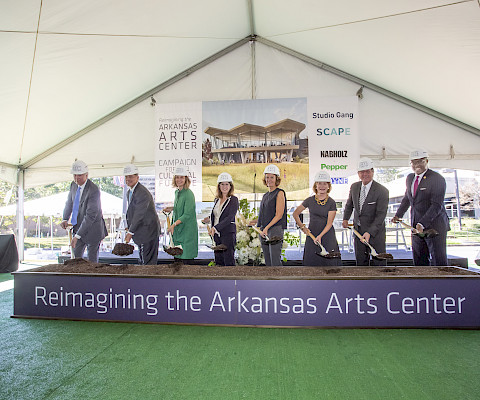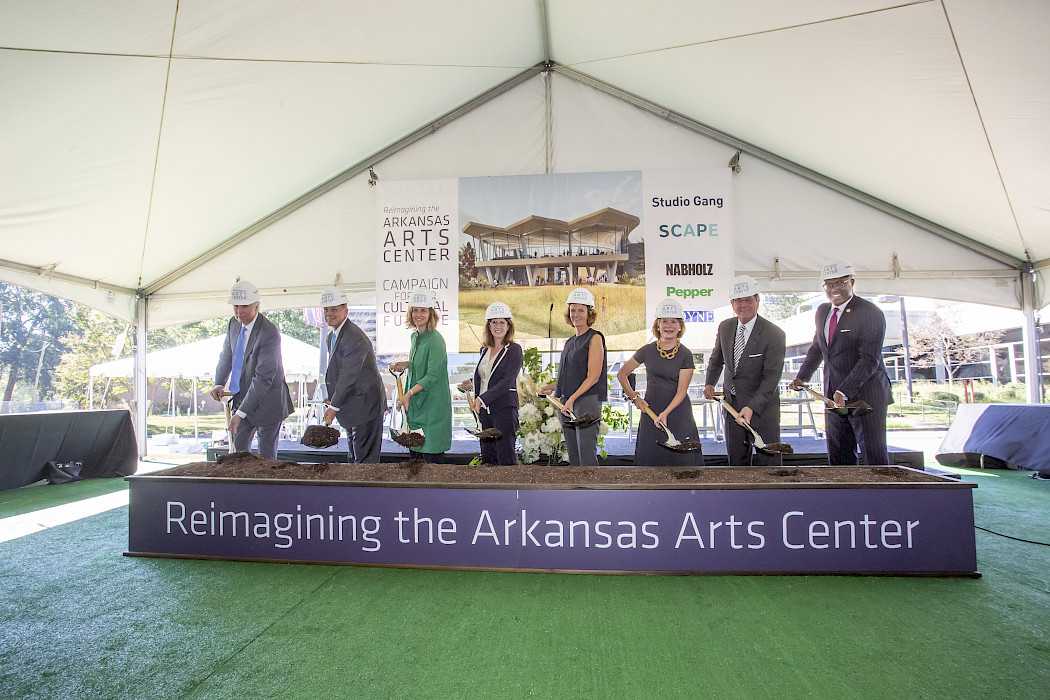About
The Arkansas Museum of Fine Arts offers an inspiring array of visual, performing arts, and educational experiences. The Museum is committed to creating an inclusive cultural space for the community to engage with diverse artistic perspectives through the AMFA Foundation’s 14,000 object permanent collection, compelling temporary exhibitions, lively theatre, and enriching courses.
Mission & Values
The mission of the Arkansas Museum of Fine Arts is to create an inclusive cultural space that inspires and builds community through the visual and performing arts. Serving the state of Arkansas and beyond, AMFA provides enriching experiences in the arts for all.
-
Welcoming
By actively engaging the diversity within our community, AMFA serves as a cultural hub where everyone is invited to grow and learn. Staff and faculty will ensure a safe, accepting, and hospitable space for personal and artistic development by offering inclusive programs with a broad audience reach.
-
Accessible
People of all ages, backgrounds, and abilities can experience the arts at AMFA. Staff and faculty will be approachable and accessible, and AMFA programs, services, and materials will be available for free or at a range of price points that are considerate of broad audiences.
-
Knowledgeable
Staff and faculty are experts in their fields. They serve in leadership roles in the state’s arts community and steward institutional resources for our community of educators, students, and partners.
-
Interactive
Wonder, playfulness, and boundless curiosity are always welcome at AMFA. By engaging the senses and encouraging doing and making, our audiences deepen their social, emotional, physical, and intellectual engagement with the arts.
-
Intentional
Relationships with community members, stakeholders, and partners will always be built with respect, trust, and a collaborative spirit in mind. AMFA works thoughtfully and purposefully with partners to strengthen community ties.
-
Evaluative
Staff and faculty will employ qualitative and quantitative analysis to guide development of cutting-edge multidisciplinary programs, to ensure responsiveness and relevance to our audiences, and to cultivate life-long relationships with the arts.
Land Acknowledgement
We acknowledge that we are on the traditional land of the Quapaw people, a land where the people had developed societal, agricultural, and sacred sites. We also acknowledge that we benefit from the Quapaw’s loss of land which had innumerable repercussions on the culture and population of the Quapaw people.
This land acknowledgement challenges us to learn about the Quapaw people, their history, culture, contributions to and continued presence in our community.
Approved by the Quapaw Nation and Arkansas Museum of Fine Arts Board of Trustees
Building Transformation
The Arkansas Museum of Fine Arts has undergone a major transformation of its building and grounds in Little Rock. Through revitalizing existing structures and uniting them with a “blossoming” central addition, Studio Gang’s design creates a 133,000-square-foot building that embraces the surrounding city and park and establishes a bold new architectural identity.
The Museum’s historic 1937 Art Deco façade is returned to its original role as the building’s north entrance. The central addition, with its organic curves and pleated roof, creates a complementary, park-side entrance at the south and establishes a light-filled, connective space that intuitively guides guests into AMFA’s Harriet and Warren Stephens Galleries, Windgate Art School, Performing Arts Theater, Cultural Living Room, Museum Store, and restaurant.
The design also treats architecture and landscape as intrinsically linked. SCAPE’s 11-acre landscape extends the Museum experience into the park, bringing a biodiverse array of new plantings that provide shade and beauty for indoor/outdoor social spaces, as well as new walking paths that allow the public to enjoy nature and view outdoor sculptures.
-
Harriet and Warren Stephens Galleries
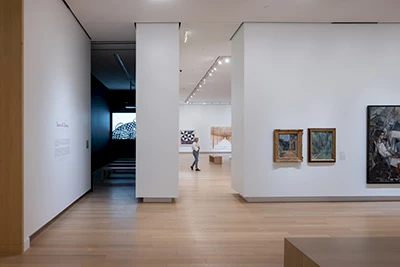
Photo by Iwan Baan AMFA’s 14,000-object international collection is showcased in an elegant new 20,000-SF gallery wing with 15.5-foot ceilings. The Museum’s permanent collection and temporary exhibitions each have dedicated galleries, while additional spaces such as the new media gallery and the Art Perch expand AMFA’s ability to display time-based and large-scale forms of art.
The Art Perch, a large window in the northernmost gallery with built-in seating, gives arriving guests a framed “sneak peek” of featured artworks displayed inside. Within the gallery, the window provides a vibrant view of the outdoor landscape and a comfortable place to rest and view the art.
AMFA’s new media gallery is a flexible gallery space with the potential to display audio-visual works designed for projectors, television monitors, speakers, and even interactive digital platforms, allowing AMFA’s programming to reflect the myriad ways artists work in the 21st century. AMFA’s dedicated new media gallery presents artworks created with video, computer animation, and interactive digital art.
-
Terri and Chuck Erwin Collections Research Center
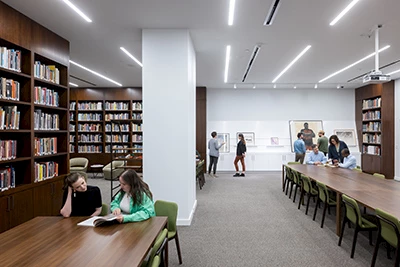
Photo by Iwan Baan Fully equipped with audio and visual capabilities, this 1,670-SF room with warm walnut paneling is designed for formal meetings and presentations, study of the collection, and other scholarly activities and gatherings in need of quieter, more intimate settings.
It is also available for hosting private events and includes access to an attached kitchenette and private restroom.
-
Windgate Art School
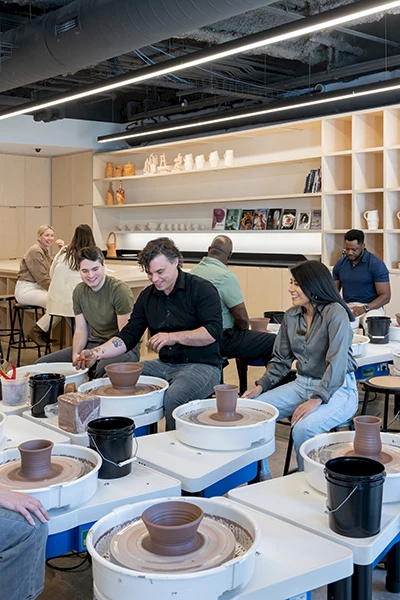
Photo by Iwan Baan The 11,000-SF school boasts multiple studios for students of all ages and skillsets with a faculty comprised of working artists in drawing, painting, ceramics, glass, metals, woodworking, printmaking, and more.
Additional spaces include the Robyn and John Horn Gallery, which features a roster of temporary exhibitions; dedicated studios for artists-in-residence, and an Art Lawn for outdoor classes and activities.
-
Performing Arts Theater
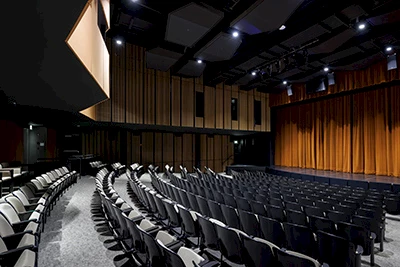
Photo by Iwan Baan The 350-seat Performing Arts Theater restores many of its unique 1960s design elements while incorporating state-of-the-art lighting, sound, and back-of-house capabilities for presenting touring stage productions, film screenings, concerts, and more.
New, slatted wood paneling on the walls improves the space’s acoustics and brings natural warmth.
-
Governor Winthrop Rockefeller Lecture Hall
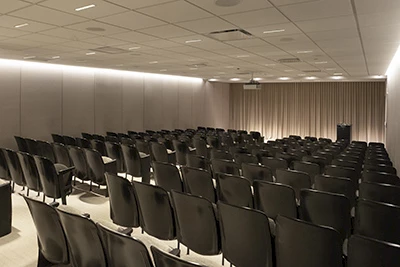
Image by Jason Masters AMFA’s lecture hall seats 153 and serves as a mid-size capacity venue for formal presentations, lectures, guest speakers, and more.
Renewed to look and function as a complementary space to the Performing Arts Theater, the hall is designed with state-of-the-art acoustics and audio and visual capabilities.
-
Cultural Living Room
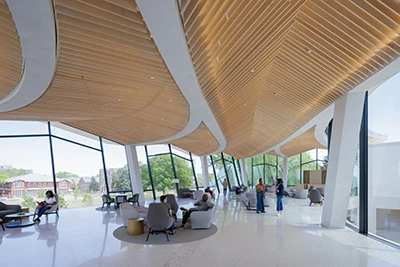
Photo by Iwan Baan The Cultural Living Room is AMFA’s signature community space—a place to relax and socialize equipped with comfortable lounge furniture and a coffee and cocktail bar.
Its flexible 5,860 SF doubles as a venue for AMFA hosted events or private functions, complete with direct access to AMFA’s catering kitchen and panoramic views of the 1937 façade and Courtyard, Crescent Lawn, and MacArthur Park neighborhood.
-
Park Grill
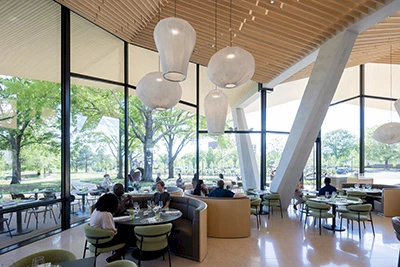
Photo by Iwan Baan AMFA’s new 2,800-SF full-service restaurant Park Grill has indoor seating and a covered outdoor dining terrace, and a private dining room.
Its dramatic, full-height windows offer immersive views of the new landscape and MacArthur Park.
-
Glass Box and Terrace
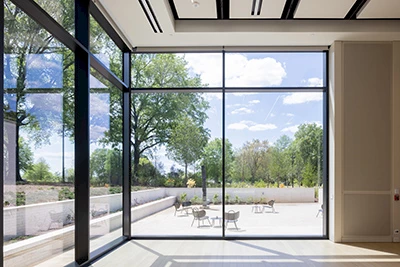
Photo by Iwan Baan This 2,640-SF space is totally transformed into a naturally lit, multi-purpose venue with high-end audio and visual capabilities and a private terrace that connects to AMFA’s south grounds, Event Lawn, and MacArthur Park.
In addition to private events, this space is used for visual and performing arts programs.
-
1937 Lobby
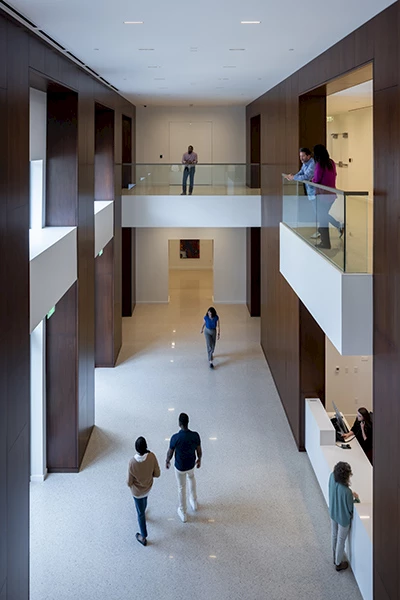
Photo by Iwan Baan Located inside the original walls of the 1937 Museum of Fine Arts, AMFA’s new 1,500-SF Lobby has walnut paneled walls and three sets of tall glass doors and windows that open views all the way to the second-floor Mezzanine, echoing the grand proportions and materiality of the original 1937 lobby.
An information desk welcomes guests, provides program information, and offers coat check services during formal events.
Museum History
The Museum’s history dates back more than 100 years. In 1914, a group of intrepid women formed the Fine Arts Club with a mission to bring the arts to Arkansas.
The Fine Arts Club planted the seeds that were realized when the Museum of Fine Arts opened in downtown Little Rock’s MacArthur Park in 1937. Built by the Works Progress Administration – and featuring a stunning Art Deco façade – the Museum of Fine Arts was the first museum dedicated to the fine arts in the state of Arkansas.
In 1959, as the museum’s art collection and mission continued to grow, the Museum of Fine Arts launched a fundraising campaign to create a statewide center for the arts. Led by Winthrop Rockefeller, who would become the governor of Arkansas in 1967, the campaign emphasized that the institution would serve all of Arkansas – and encouraged Arkansas residents to get involved. Businesses and individuals from all parts of the state made donations – including children who saved nickels and dimes in jars. In 1960, the Little Rock Board of Directors adopted an ordinance officially establishing the Arkansas Arts Center, and the new building – an addition to the 1937 museum – opened in 1963.
Over the next 50 years, as the institution and its mission continued to grow in scale and in scope, the Arkansas Arts Center’s MacArthur Park building underwent seven further expansions to accommodate its growing collection and community. In a 1982 renovation and expansion, the Museum of Fine Arts’ art deco façade was preserved as a feature of the building’s interior galleries.
In 2016, a project to reimagine the Arkansas Arts Center for the 21st century began when Little Rock residents voted overwhelmingly in favor of a hotel-tax bond to renovate its MacArthur Park building. That same year, Studio Gang was selected as the project’s design architects for their vision of the new building. In 2017, SCAPE joined as the project’s landscape architects with Polk Stanley Wilcox Architects as associate architects.
In October 2019, this transformational project broke ground, and in 2021, the Arkansas Arts Center changed its name to the Arkansas Museum of Fine Arts. On April 22, 2023, AMFA celebrated its historic Grand Opening with a ribbon-cutting ceremony, then officially opened its doors for guests.
The Arkansas Museum of Fine Arts is supported in part by the Arkansas Museum of Fine Arts Foundation; Arkansas Museum of Fine Arts Foundation Board of Directors; Arkansas Museum of Fine Arts Board of Trustees; Windgate Foundation; City of Little Rock; City of North Little Rock; and Arkansas Arts Council, an agency of the Arkansas Department of Parks, Heritage, and Tourism, and the National Endowment for the Arts.
